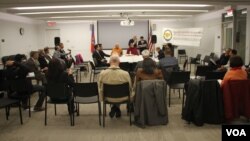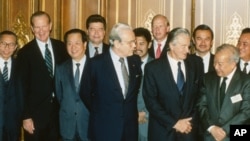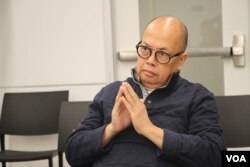Cambodian-Americans have called on the signatories of the Paris Peace Accord to ensure Cambodia returns to a multi-party democratic system following controversial elections that saw Prime Minister Hun Sen’s ruling party win all seats in the legislature.
The appeal was made at a meeting of the Overseas Khmer Summit (OKS) in Washington, DC, attended by Cambodian-Americans from several US states.
Yung Yap, secretary general of the OKS, said respect for the tenets of the accord, which ended Cambodia’s civil war and enshrined pluralist democracy in the newly forged Cambodian democratic system, was more vital than ever.
“Because of the Paris Peace Agreement, all parties ceased quarreling,” he said.
The accord was signed in 1991 by 19 countries, including the United States.
Rany Lushinski, deputy president of Cambodian Americans for Human Rights and Democracy, an advocacy group, said: “We, the Cambodians outside the country, appeal for the international community not to abandon our country as they did in the Pol Pot era.”
Cambodia’s July general elections drew international criticism after Hun Sen dissolved the country’s main opposition party, the Cambodia National Rescue Party, jailed its leader, Kem Sokha, and banned more than 100 CNRP officials from politics for five years.
Independent media outlets, rights activists and civil society groups were also targeted in the purge.
Eng Chhay Eang, vice president of the CNRP, told VOA Khmer at the event that Hun Sen’s Cambodia was a “communist regime because the Hun Sen regime is now leading Cambodia towards absolute authoritarianism.”
The United States has placed visa restrictions on several high-ranking government officials and placed sanctions on the head of Hun Sen’s bodyguard unit. The European Union is also considering removing Cambodia from a preferential trade scheme if the situation does not improve.
But Phay Siphan, a government spokesman, said the government was prepared to weather the storm. The Paris accord nations had “vowed not to interfere with Cambodia’s sovereignty,” he said, claiming the crackdown on dissent was about Cambodia “defending its independence and deciding its fate by itself.”
But it will take a lot to convince OKS attendees such as Seng Sophan, head of the Canada-based Committee for Election Rights of Overseas Cambodians.
“No matter how they say it, no-one believes it,” he said, responding to the government’s position.
“The more severely you violate the constitution, the more divisive our country becomes.”
Sok Sakoun, another OKS participant, said the government is not “fully legitimate.”
“Based on de facto theory, it’s not fully legitimate, yet operational,” he said. “Only the Cambodian people and the international community are the ones to determine whether the sixth mandate government can proceed until the end of this mandate.”









